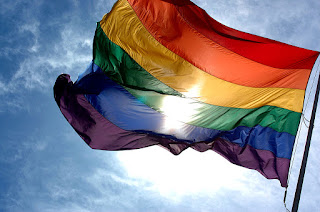 I've seen a lot of comments today against the Supreme Court's ruling, making all bans on same-sex marriage unconstitutional. Many, if not all, of these comments are based on religion. the main objection seems to be that marriage was instituted by God and God said it was between a man and a woman. This is either untrue or irrelevant on several fronts.
I've seen a lot of comments today against the Supreme Court's ruling, making all bans on same-sex marriage unconstitutional. Many, if not all, of these comments are based on religion. the main objection seems to be that marriage was instituted by God and God said it was between a man and a woman. This is either untrue or irrelevant on several fronts.Our country is not a theocracy. Even though the majority of our country as always been at least nominally Christian (at least after the European colonists had killed off or converted enough of the original inhabitants), and some argue that the Founders set out to found a Christian nation, i.e. a nation based on Christian values. None of that makes this country a theocracy. The First Amendment to the Constitution, among other things, forbids the establishment of religion. There has been and will continue to be debate over precisely what this implies, but it has been interpreted broadly to remove religious views as a basis for any of our laws.
But I would be willfully ignorant to pretend that there aren't many, even among the judiciary, who believe that this is a Christian nation wherein the laws must conform to Christianity.
The main contention among those who wish their religion to be the deciding factor in marriage laws is that God instituted marriage and that it was to be between one man and one woman.
So, let's look at that position. I think that it can be demonstrated that many civilizations other than the ancient Hebrews had marriage as part of their culture and that it definitely, unarguably, predated Christianity. Biblically minded people may counter that marriage was instituted in Genesis, and that nothing predates that. Okay, let's examine that argument. While there are many examples of biblical marriage being between one man and one woman, there are many more where marriage is something different: between one man and multiple women; between one man, one woman and her slave; between one man, two women and two handmaids; between one man and the woman he raped (as long he paid off her father). My point is that our cultural definition of what marriage is has changed. Few would argue that a marriage should include slaves or handmaids and virtually no one would argue that a rapist can buy his rape victim from her father; well, it's changed again people!
Many people are now in an uproar, believing that somehow the rights of the religious believers are being trampled upon. If your religion teaches that homosexuality is a sin, you're still free to believe that; your ministers will not be forced to conduct same-sex marriages; churches will still be able to define who meets the requirements to be married under their auspices. It doesn't affect you in any way whatsoever.
Some have brought up the examples of religious bakers or caterers "forced" to supply cakes or to cater at a same-sex wedding. To those people I ask whether you so assiduously police all the so-called sinful actions of people that you potentially do business with. probably not.
Many states have had legal same-sex marriage for years now and have not turned into Sodom & Gomorrah; think about Iowa, a decidedly conservative Midwestern state.
We've moved forward...move with us



